“I want to start a business but have no ideas.” Starting a business can be an exciting adventure, but it often begins by facing the same challenge: finding the right idea. Many hopeful entrepreneurs really wish to create something important.
However, the “what” and “how” can be difficult to determine. The good news is that you don’t have to start with a revolutionary idea; you need a way of thinking focused on problem-solving, creativity, and not giving up.
Most of the good business ideas often arise by identifying gaps in the market, solving everyday problems, or just pursuing what you love to do and your talents. Whether you wish to engage in a side hustle, dive into e-commerce, or start a service-based business, there’s a pathway for everyone.
This blog explores practical steps on how to find business ideas, validate them, and then move toward starting your entrepreneurial journey. Every successful business starts with a little curiosity and readiness to take the first step. Let’s get started!
Common Challenges Faced by Aspiring Entrepreneurs
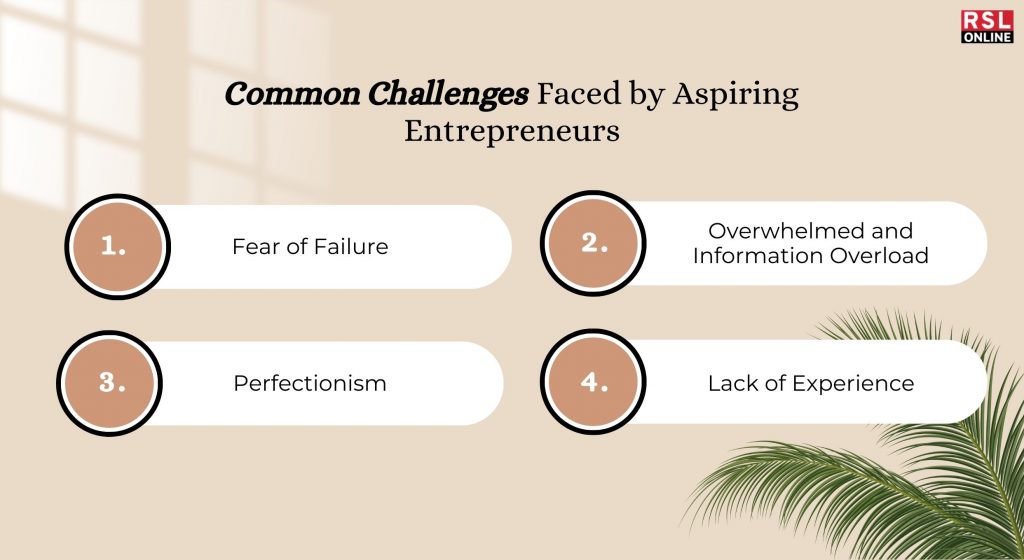
If you want to start a business but have no idea, you must check out the most common problems you may face. Some of the most common issues encountered by first-time business owners are as follows:
- Fear of Failure: the fear of failure can be highly paralyzing, preventing anyone from taking the leap and making a move. To err is to learn. Mistakes are an opportunity for growth and improvement.
- Overwhelmed and Information Overload: The information is plenty, and sometimes it’s hard to take it all in. Pay attention to the most important things to consider in starting a business: market research, business planning, and finance management.
- Perfectionism: Perfectionism may lead to procrastination or analysis paralysis. It is better to take action and then iterate on your idea rather than waiting for things to be perfect.
- Lack of Experience: Many new business owners lack the experience needed to respond to the business’s challenges. Getting mentors or joining business groups and taking classes will overcome this problem.
Getting over these requires mindset adjustment, practical strategies, and support from a robust network. Embracing the idea of failure as learning, breaking tasks into much easier smaller steps, and having advice from someone who has stood there before increases the prospect of success for those starting a new business.
Brainstorming Techniques for Generating Business Ideas
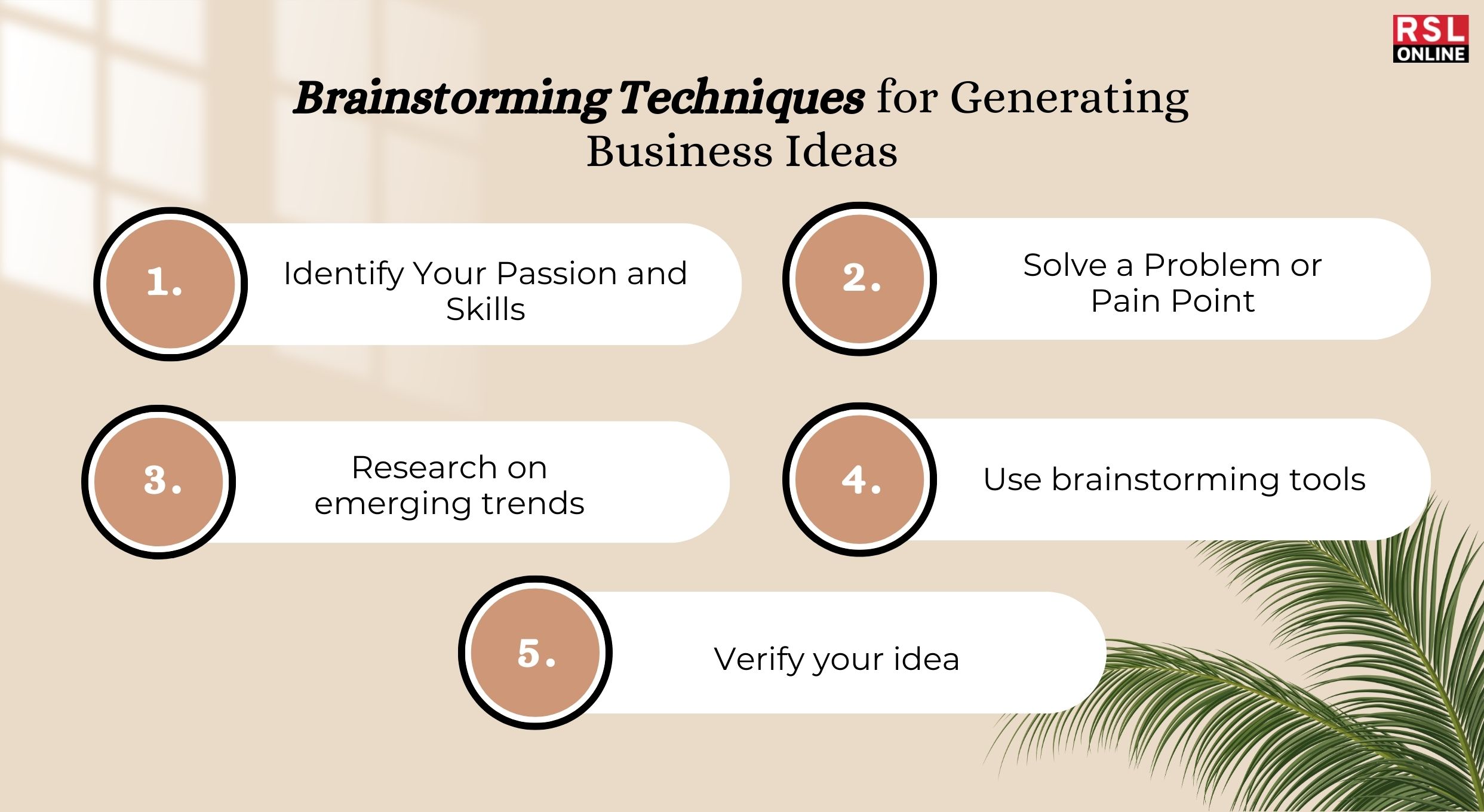
Perhaps you are an aspiring business owner and want to start a small business, but then you begin to think, “I want to start a business but have no ideas.” That is precisely where brainstorming comes into action.
Brainstorming is considered a great way to bring out your creative side and create a comfortable space where you can come up with many new business ideas. This brainstorming phase helps you to find a way to your profitable business.
To generate innovative business ideas, consider the following techniques:
Identify Your Passion and Skills
What do you feel most passionate about? What are your strengths and skills? A business idea that is related to your passion and strength will have the potential to yield better motivation and success.
Solve a Problem or Pain Point
Identify the problems or pain points that exist in people’s lives. From there, develop solutions to the issues, and business opportunities will be born.
Research on Emerging Trends
Emerging trends are essential for keeping up with recent technological developments, innovation, lifestyle, and consumer behaviour. They can lead to new business ideas and help identify underdeveloped markets.
Use Brainstorming Tools
Brainstorm your ideas and mind-map on thoughts. Also, try to set it out on one side. One has to hold it either on Miro or Figma. Systematized thoughts for better generations.
Verify Your Idea
Verify that before starting to launch your business, try to do market research, reach out to potential customers, and/or create a minimum viable product and test its viability.
These together empower the person to brainstorm and build up innovative ideas on doing business for winning success.
Now, I am going to discuss about brainstorming techniques that you can use to generate business ideas:
Mind-mapping: This can help you organize all your thoughts and identify gaps in your knowledge.
Brainwriting: If you are willing to partner with a friend to start the business, then you can write down all the ideas on paper, simply pass them around, and try to build on each other’s new ideas.
Associative brainstorming: You can use word connections to form further relationships between all the ideas.
Rapid ideation: You can try setting a time limit, somewhere around 5 to 10 minutes, and try to write down as many ideas as possible.
Reverse brainstorming: You can try to come up with ways that can make a problem even worse. Once done, try to move backwards from the hypothetical catastrophe.
SWOT analysis: This analysis can help you to identify the strengths, weaknesses, opportunities, and threats of the business idea.
Starbursting: This trick would help you to develop the related questions based on the central idea.
Storyboarding: Lastly, you can try creating a visual narrative storyboard that can help you explore the concept or the problem itself.
Examples of Low-Cost Business Ideas
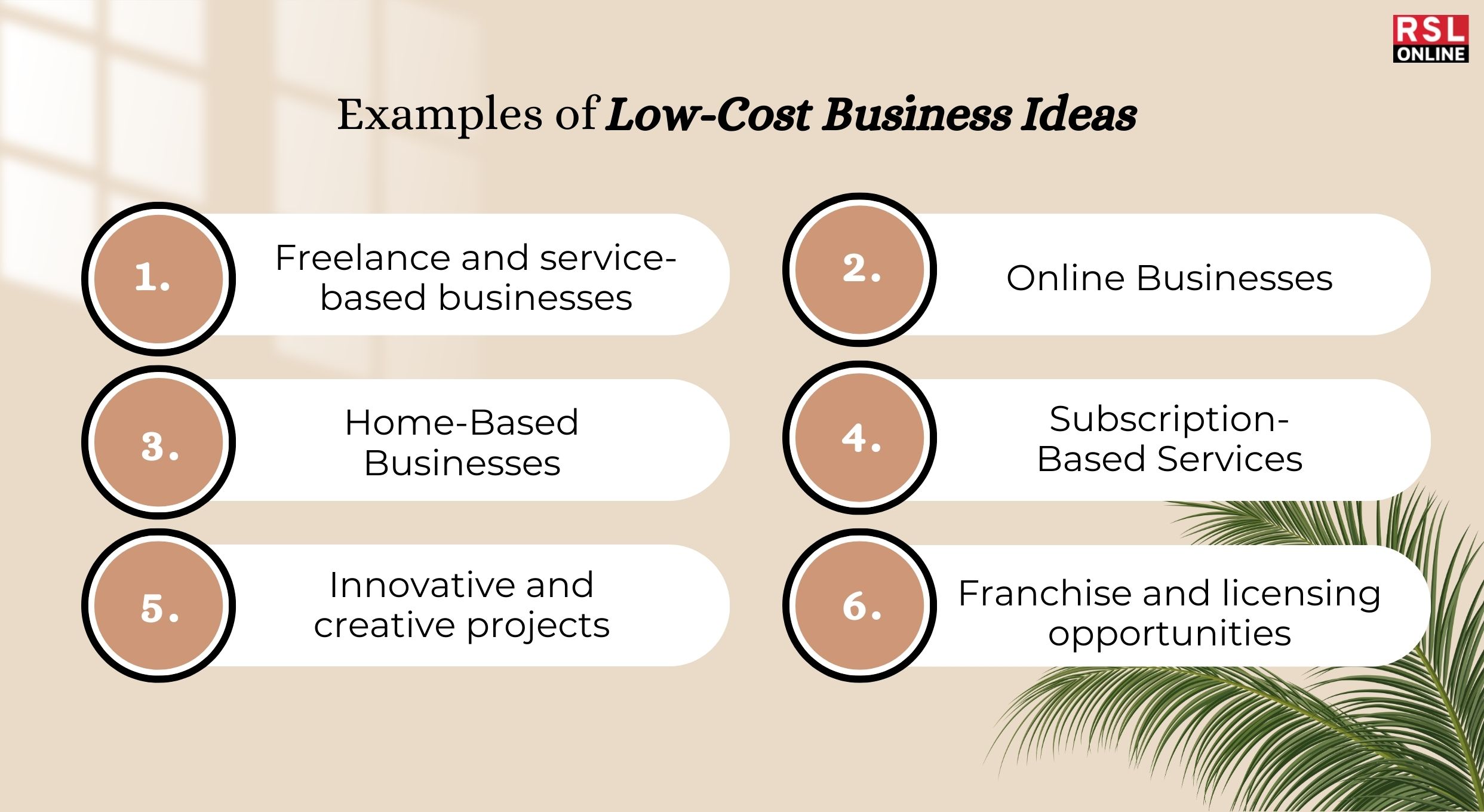
You do not need to spend too much to start a business. If you are thinking, “I want to start a business but have no ideas and no money,” then this section is the perfect answer for you.
First, find a market for you to serve and then good products and services in your business. Then, promotion of that particular business nicely. Finally, with more effort and consistency, perhaps the business idea could come true.
Successful businesses can be started with very little money in hand. Here are some cheap but unique business ideas that may inspire you.
Freelance and Service-based Businesses
This is a type of service-based business where an individual or even a small group offers their services to clients on a project-to-project basis.
Services businesses, on the other hand, are enterprises that provide work and assistance to customers. They mostly have a team of experts or even professionals.
- Virtual Assistant: Give clients administrative, technical, or other kinds of support from elsewhere.
- Freelance writer: Article, blog post, or content writing of any company or person.
- Graphic Designer: Design logos, brochures, and other image-related things.
- Social media manager: Manage social media accounts for individuals and organizations.
- Online Tutor: Teach a subject that you are well-trained in, like math, science, or language arts.
Online Businesses
The online business mainly generates primary revenue through the help of the internet. This process would involve selling various products as well as services. These services would include digital downloads, creating content, and promoting the business products through affiliation marketing.
- E-commerce store: Selling products online, from handmade crafts to digital downloads.
- Affiliate marketing: Start with a blog on your knowledge, passion, or expertise and monetize it from ads and affiliate marketing to sponsored content.
- Dropshipping: Selling products without holding inventory and fulfilling orders directly from suppliers.
- Print on Demand: Individual selling of products, including t-shirts, mugs, and phone case sales.
- Creating and distributing digital products: Design, marketing, and selling an e-book, a course, or stock photos.
Home-Based Businesses
A home-based business is basically a small business that mainly operates from the owner’s home. Here, the HBB or home-based business is known for having a small number of employees such as family members who can work for the home-based business or they can even the business owners.
- Domestic House Cleaning Service: Cleaning houses and offices.
- Meal prep services: They will prepare and deliver healthy meals to busy individuals and families.
- Pet Sitting and Dog Walking: Taking care of pets when the owners are away.
- Childcare Service: Childcare service in the comfort of your home or even in clients’ homes.
- Home Bakery: Bake cakes, cookies, and all other baked items, sell.
Subscription-Based Services
Subscription-based services are mainly products and services that customers pay for on a recurring basis. This can be either monthly or yearly basis. Some service providers provide subscriptions even on a weekly basis.
- Subscription Box: Subscription Box Collect and dispatch boxes of products with a theme to subscribers.
- Subscription to Online Courses: Offer access to online courses for a monthly or yearly subscription.
- Membership Site: Develop a membership site with exclusive content and resources for subscribers.
Innovative and Creative Projects
Innovative as well as creative projects are the kinds of projects that involve the utmost development as well as the implementation of new ideas. This helps to create value for consumers and users,
- Handcrafting items: Sell your handcrafted items, paintings, or jewellery at local markets or through online sales.
- Photography: take photographs of events, portraits, or products.
- Music production: create and record, or sell it yourself, and assist others in doing the same.
- Writing and publishing: Write and publish your own books, ebooks, or poems.
- Web Design and Development: Develop and design websites for companies and individuals.
Franchise and Licensing Opportunities
Franchising and licensing are both known as business agreements that comprise brand aspects for free. Franchising is mainly used to achieve multi-unit expansion of the brand. Here, the brand has various franchised locations that maintain as well as operate under uniform standards.
Licensing is basically used to monetize trademarks and all the other intellectual properties that are acquired by independent businesses.
- Food franchises: Invest in a food franchise with a proven business model.
- Retail Franchises: Opening a franchise of any popular retail brand.
- Service Franchises: Start a franchise business of a service company such as cleaning or fitness.
Resources for Further Exploration
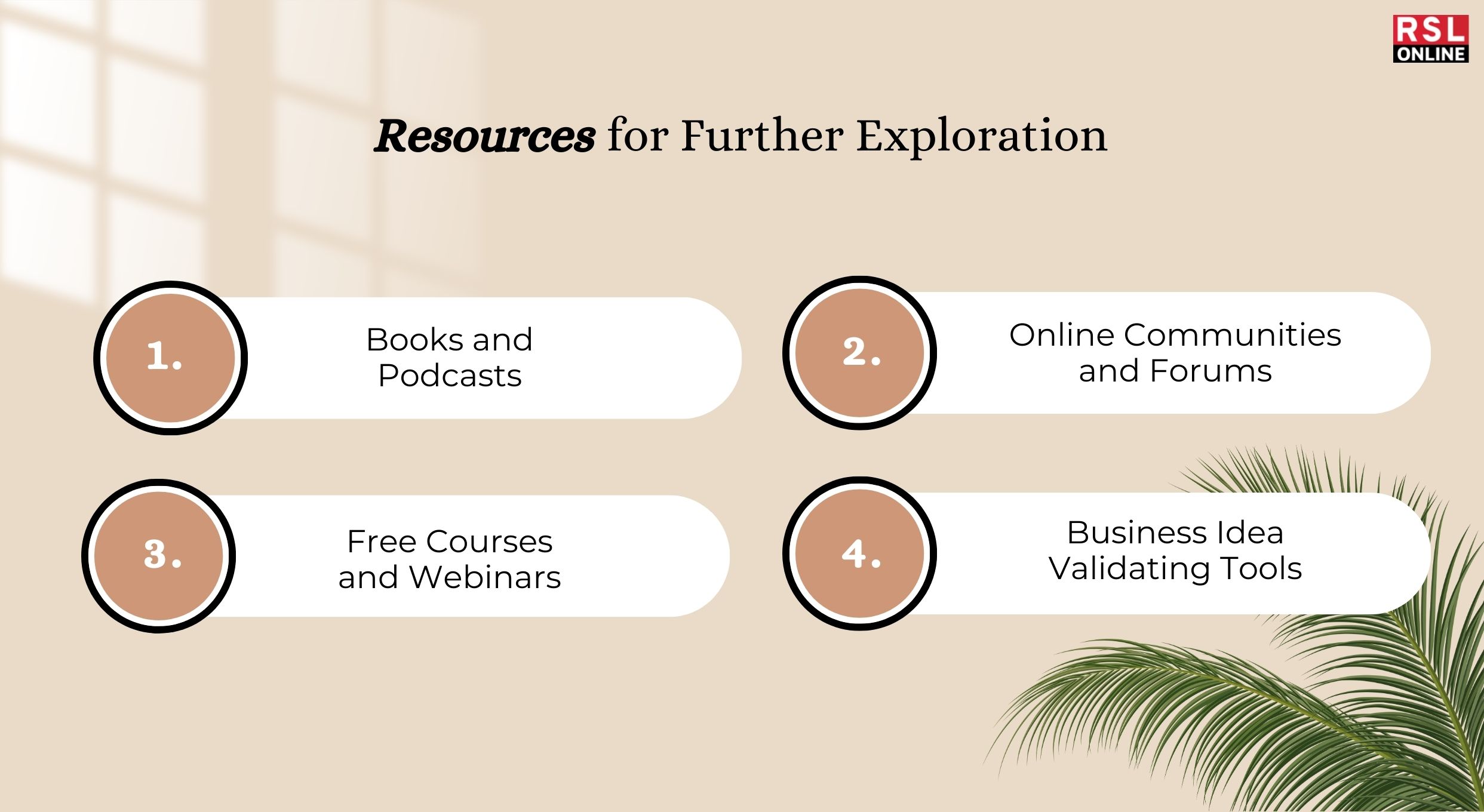
Feeling lost in business ideas? Don’t worry; you are among thousands. Here are some resources for the ignition of your spark.
Books and Podcasts
Literature: Engage with the cognitive processes of successful entrepreneurs. Literature such as “The Lean Startup” by Eric Ries or “Think and Grow Rich” by Napoleon Hill are good reads.
Podcasts: Follow business-oriented podcasts like “How I Built This” or “The Tim Ferriss Show” for motivational stories and real-life guidance.
Online Communities and Forums
Reddit: Participate in communities such as r/Entrepreneur or r/Small Business, in order to connect fellow interested persons who may forward suggestions to ideas*.
LinkedIn: Connect with people who operate in your industry and network and share information with experienced entrepreneurs.
Free Courses and Webinars
Online courses: Online courses through Coursera and edX for entrepreneurial skills, business strategies, marketing, and more.
YouTube: Subscribe to channels like “The Entrepreneurship Rollercoaster” or “GaryVee” for free business tips and advice.
Business Idea Validating Tools
SurveyMonkey: Make surveys to collect interest from your potential products or services.
Google Trends searches: These searches with trends to trace growing markets and the intent of consumers.
Social Media Listening Tools: Monitor social media conversations to understand public sentiment and identify unmet needs.
Only a systematic exploration of someone’s passions and interests makes it possible to understand and identify an efficient process to find a promising business idea. It is by such means that a person should have enough information and ideas to start realizing their dream.
Taking Action: First Steps to Start Your Business
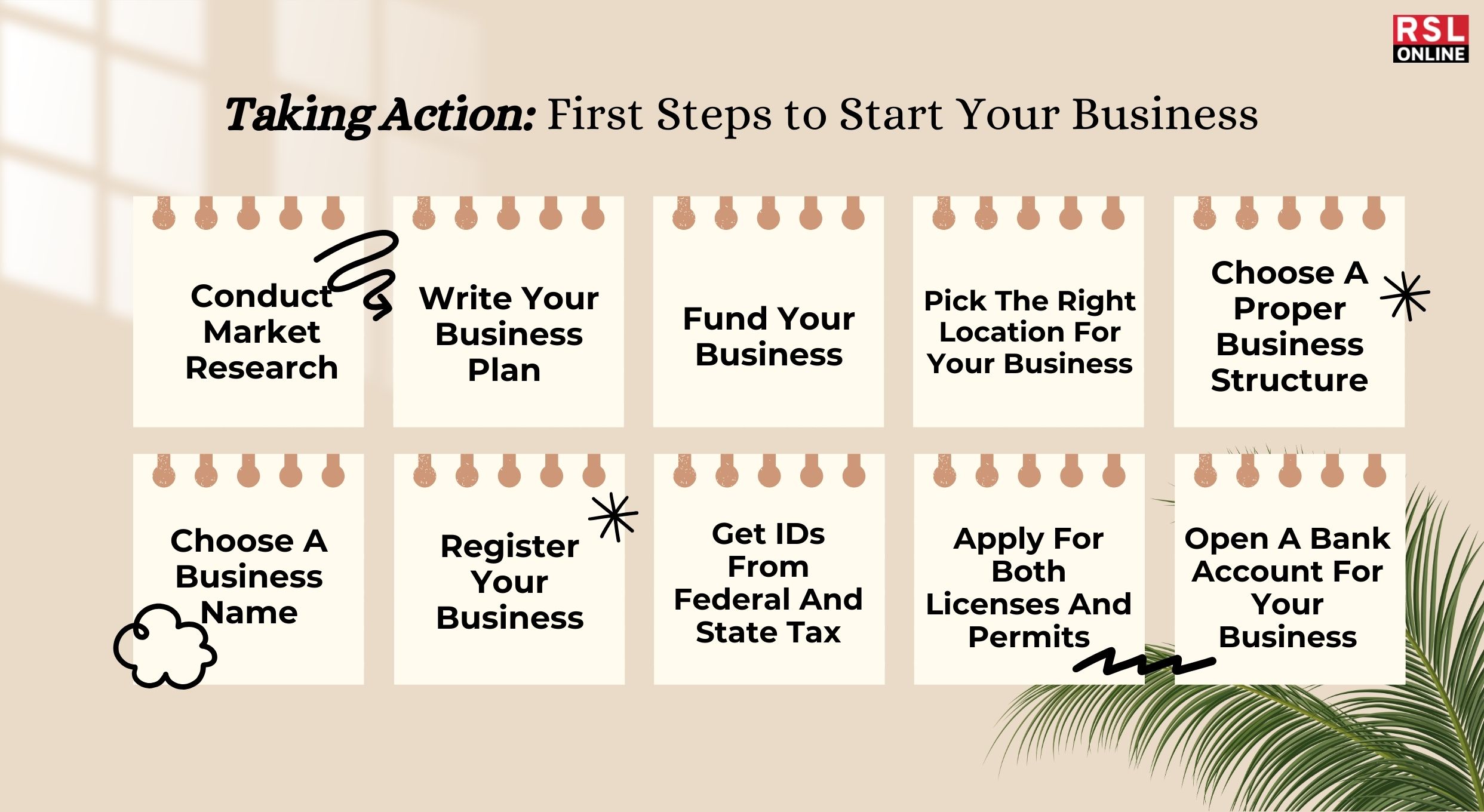
Starting a specific business involves intense planning, making financial decisions and further completing all kinds of legal activities. In this section, I am going to explain the top 10 steps that can be useful for you to take the first step of your business. Read on.
Conduct Market Research
The market research will help you to understand if there is any opportunity in the market that can convert your idea into a successful business. This is more like a way to gather information about potential customers and companies that are already operating in your area.
Write Your Business Plan
Your business plan is the main foundation of your business. It creates the roadmap for how exactly you are going to structure your business, run it, and further grow your business. You can even use the business plan to persuade people to work with you or invest in your business.
Fund Your Business
Your entire business plan is going to help you figure out how much you will need to start your whole business. Let’s say you do not have that much amount in your hand; in that case, you will either have to raise it (maybe through crowdfunding), or you can borrow the capital.
There are many more ways that you can find to fund your businesses. So, understand which way aligns with your planning and invest the capital that you need.
Pick the Right Location for Your Business
The most important decision that you can make for your business is the business location. Whether you are planning to set up a brick-and-mortar or an online store, the location choice could affect your taxes, revenue, and legal requirements.
Choose a Proper Business Structure
The right kind of legal structure for your business can be impactful for your business registration requirements, how much you pay for taxes and lastly, and lastly, your personal liabilities.
Choose a Business Name
It is not very easy to pick the right name for your business. Maybe you want a name that can strongly capture the brand and your spirit. Also, focus on choosing a business name that has not been selected by anyone else.
Register Your Business
Once you are done pick the perfect business name. Now, it is high time to make it legal and further protect your brand. If you are doing a business that has a different name than the one you own, in that case, you must register yourself with the federal government. In some cases, you need to register yourself with the state government too.
Get IDs From Federal And State Tax
Here, you will have to use your employer identification number or EIN for the critical steps, in order to start and further grow your business. It is more like opening a bank account and further paying the taxes. These IDs are like social security numbers for your business.
Apply for Both Licenses and Permits
You must always try to keep your business running smoothly while maintaining legal compliance. The licenses as well as permits that you need for your business can also vary based on industry, state, location and several other factors.
Open a Bank Account for Your Business
Opening a small business checking account can be helpful for you to handle legal matters, taxes as well as day-to-day issues. The good news is that it is very easy to set up a business bank account. You just need to prepare the proper paperwork and all the other legal documents.
Final Words!
It does not need perfection to start a business; it needs action. You just must stay focused, use the skills that you have, and solve real-world issues. The road may not be easy, but worthwhile if persistence and a plan set the pace. Start on that first step today, thereby making your entrepreneurial dreams real in reality.
Read More:




























